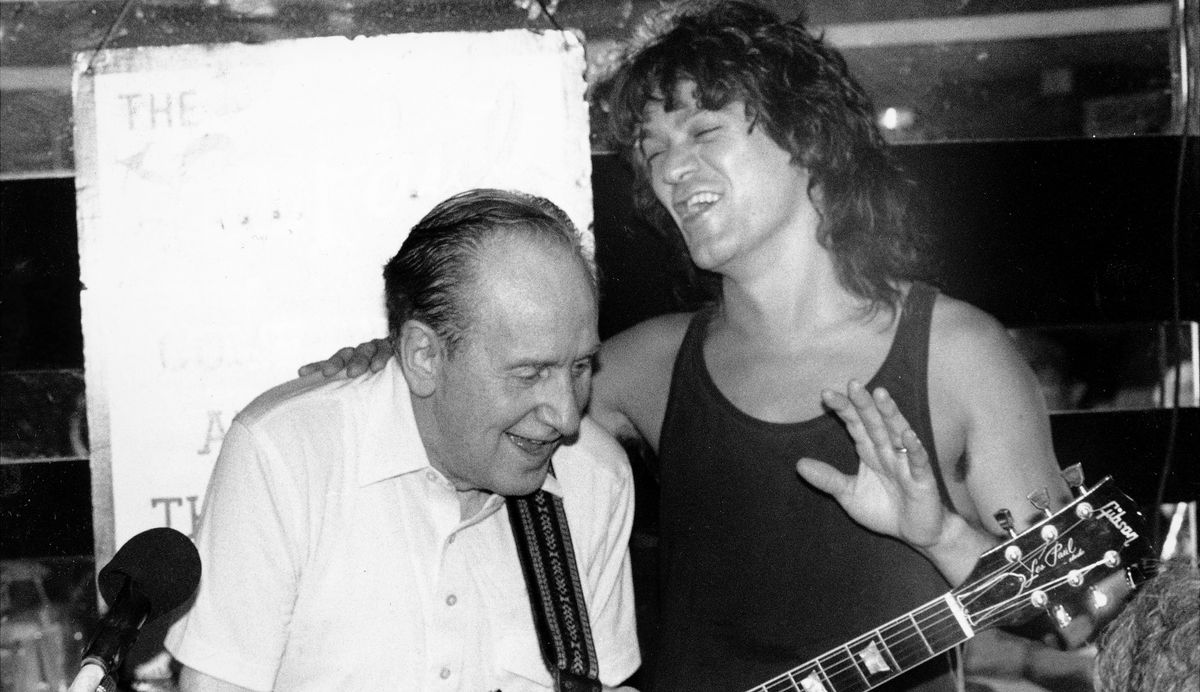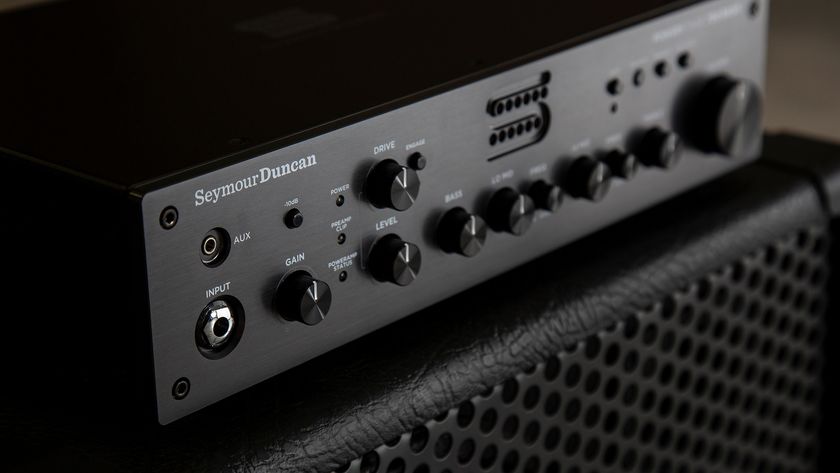Eddie Van Halen interviews Les Paul about his friendship with Leo Fender, the SG, and his favorite Les Paul model of all time
In this 1986 classic from the GW archives, the guitar pioneer also reveals why he was relieved when Fender released the Broadcaster model in 1950

The following is an excerpt from a story that originally appeared in the November 1986 edition of Guitar World.
In the summer of 1986, Guitar Center opened a mammoth music store on Sunset Boulevard in the center of Hollywood. Eddie Van Halen and Les Paul were being honored along with several other musical giants, including Stevie Wonder and amp builder Jim Marshall, as part of the store’s opening celebration.
It seemed natural to take the opportunity to put Ed and Les together in the same room to talk about what they knew best – playing the guitar.
Eddie Van Halen: When Leo Fender was doing his thing and you were doing yours, was there ever any competition?
Les Paul: "No, not at all."
Did you ever collaborate or talk about your ideas?
"Absolutely. Leo Fender would come over, and so would his engineers. They saw the Log and some of the other guitars I had built. They saw it all happening. There was never any friction. It was just the opposite.
Get The Pick Newsletter
All the latest guitar news, interviews, lessons, reviews, deals and more, direct to your inbox!
"Here’s the story of how Leo really helped me: When I developed my first solid-body guitar in 1941, I took it to Gibson and they dismissed it. They called it that 'broomstick with the pickups on it.' From 1941 to 1951, I couldn’t convince Gibson to do a damn thing about putting out a Les Paul guitar. Finally, Leo decided to come out with the Fender solid-body line, and immediately Gibson said, 'Find the character with the broomstick with the pickups on it!'
"And so they asked me to design a guitar. I thank Leo for coming out with his Broadcaster, because it woke Gibson up. Gibson was asleep and Fender was not asleep. That’s the way it goes. Fender was the first to market, but I was way, way out front."
It’s kind of like the car business – Toyota woke up GM.
"Sure. Sometimes you gotta wake somebody up, and sometimes I need some help from my friends. And I consider Leo Fender a very dear friend. To me, I am a Gibson man, but that doesn’t make any difference, because I also know exactly what Fender is all about."
With my guitars, I guess I’m trying to bring together what you and Leo have done. There are things I’ve always liked about Gibsons and things I’ve always liked about Fenders, but neither one did everything that I wanted, so I’ve created a combination of the two. My guitar is essentially a Strat body with Gibson humbucking pickups.
"I can’t always get what I want out of a standard Gibson guitar either. There are so many times that I’ll go into Gibson battling to win a point and come out with a compromise. The world is a compromise and so this is what you have to do. It can cost millions of dollars to retool and move something a quarter of an inch.
"I understand that some of my ideas would cost a fortune. Another thing that comes into the picture is the preoccupation with how something looks. I’ve had executives veto an improvement because their wives didn’t like the way it looked. They’re not thinking about the sound."
I’ve had that problem with companies I’ve worked with. I’ve had difficulty getting something the way I wanted it, because they claimed that other people want it a different way.
"Which may be right and may not be right."
Yeah, yeah, but if they want my opinion, then I’m giving it to them. I’ve had to say, “I don’t want my name on it if it ain’t the way I want it.”
"I had a case where they put out a guitar without my blessings and I tried to make ’em stop! The funny thing is they didn’t stop it, and it turned out to be their number-one seller. [laughs] So you can be wrong.
"Gibson put out an SG, and it wasn’t with my blessings at all. They put the pickup in the wrong place, they made the body too thin, and there were a lot of other things I didn’t like.
"So I said, 'Clean it up a little bit, will ya, before you put my name on it.' So they took my name off of it and continued to make it, and it’s their best-selling solid-body guitar to date. Sure, it’s a cheap guitar and it doesn’t sound as good as the others, but it’s a different thing. And it turned out I shouldn’t have said what I said."
When you design guitars, do you design them for sound or cosmetics?
"Sound. But don’t get me wrong, design is important."
It’s got to look cool, but it better sound good.
"Exactly. It’s nice to have both elements. I wanted the Les Paul to look good. That’s why we put that finish on it and made it with a [sculpted] top, so you could have that clean, violin look to the guitar. It makes it look like a Stradivarius, and you associate it that way, too."
When you pick up a guitar, which guitar do you pick up?
"I like the feel of my 1975 Deluxe the best. It’s actually a reject."
Those are the ones I love. Got any extras around? I’m serious.
"Yeah, sure."
I’m serious. If it’s a reject and you like it, I know I’ll like it.
"Well, not necessarily, because everybody has their own feel."
I can guarantee you…
"Everybody has a certain thing in their head of what they want to do and how to do it and their own technique. Everything about them calls for certain requirements."
I’m getting the feeling from you that you go for the same goddamned fucking thing that I go for. It’s not the appearance of the goddamned thing. I don’t care if it’s a flametop or whatever. It’s the feeling of it and the way it sounds.

“I get asked, ‘What’s it like being a one-hit wonder?’ I say, ‘It’s better than being a no-hit wonder!’” The Vapors’ hit Turning Japanese was born at 4AM, but came to life when two guitarists were stuck into the same booth

“Let's play... you start it off now, Stevie”: That time Stevie Wonder jammed with Stevie Ray Vaughan... and played SRV's number one Strat




![[L-R] George Harrison, Aashish Khan and John Barham collaborate in the studio](https://cdn.mos.cms.futurecdn.net/VANJajEM56nLiJATg4P5Po-840-80.jpg)




